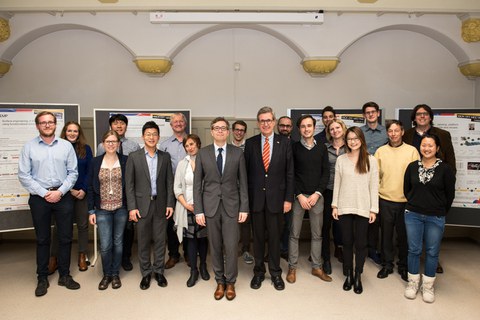Dec 07, 2016
Joint Graduate School with South-Korea

Go-Ahead for German-Korean Graduate School iEGSEMP on 2 November 2016.
On 2 November, TU Dresden took another step forwards in terms of international collaboration with Korea. The official launch of the newly established International Graduate School ”International Excellence Graduate School on Emerging Materials and Processes“, iEGSEMP for short, took place at a kick-off meeting in the villa of TUD’s Graduate Academy. In the group, which is funded by TU Dresden’s Institutional Strategy, seven German junior researchers will be working together with colleagues in Korea on topical issues to do with materials research and development.
The decision to set up this school was made a little over a year ago at the German-Korean Conference »Science and Innovation« in Seoul, in the presence of Joachim Gauck, President of the Federal Republic of Germany. In Seoul, the Rector of TU Dresden, Prof. Hans Müller-Steinhagen, signed a Letter of Intent, together with the Presidents of the Korean top-level research institutions POSTECH (Pohang University of Science and Technology), UNIST (Ulsan National Institute of Science and Technology) and Yonsei University. This Letter of Intent will now be put into practice.
At TU Dresden, the iEGSEMP forms an interface of activities carried out by the three Chairs of Physical Chemistry (Prof. Alexander Eychmüller), Molecular Functional Materials (Prof. Xinliang Feng) as well as Material Sciences and Nanotechnology (Prof. Gianaurelio Cuniberti), and the Fraunhofer Institute IKTS (Dr. Jörg Opitz), in this way pooling interdisciplinary competencies in physics, chemistry and materials science. The main goal of the school is to strengthen the existing long-standing and successful collaboration between TU Dresden and the partner institutions in Korea by means of daily intensive discussions among junior researchers.
“Even though in these times of Skype and WhatsApp, distances seem to be disappearing, digital communication cannot replace personal contact. The German and Korean PhD candidates at the iEGSEMP will travel to the respective partner country for six months and will advance their research in the partner groups there,” says Prof. Cuniberti, who will be the school’s co-ordinator, before continuing: “This will provide our PhD candidates not only with an excellent scientific education but also with important international experience in a leading Asian country in terms of economy and science, whilst enabling them to acquire important intercultural skills.”
